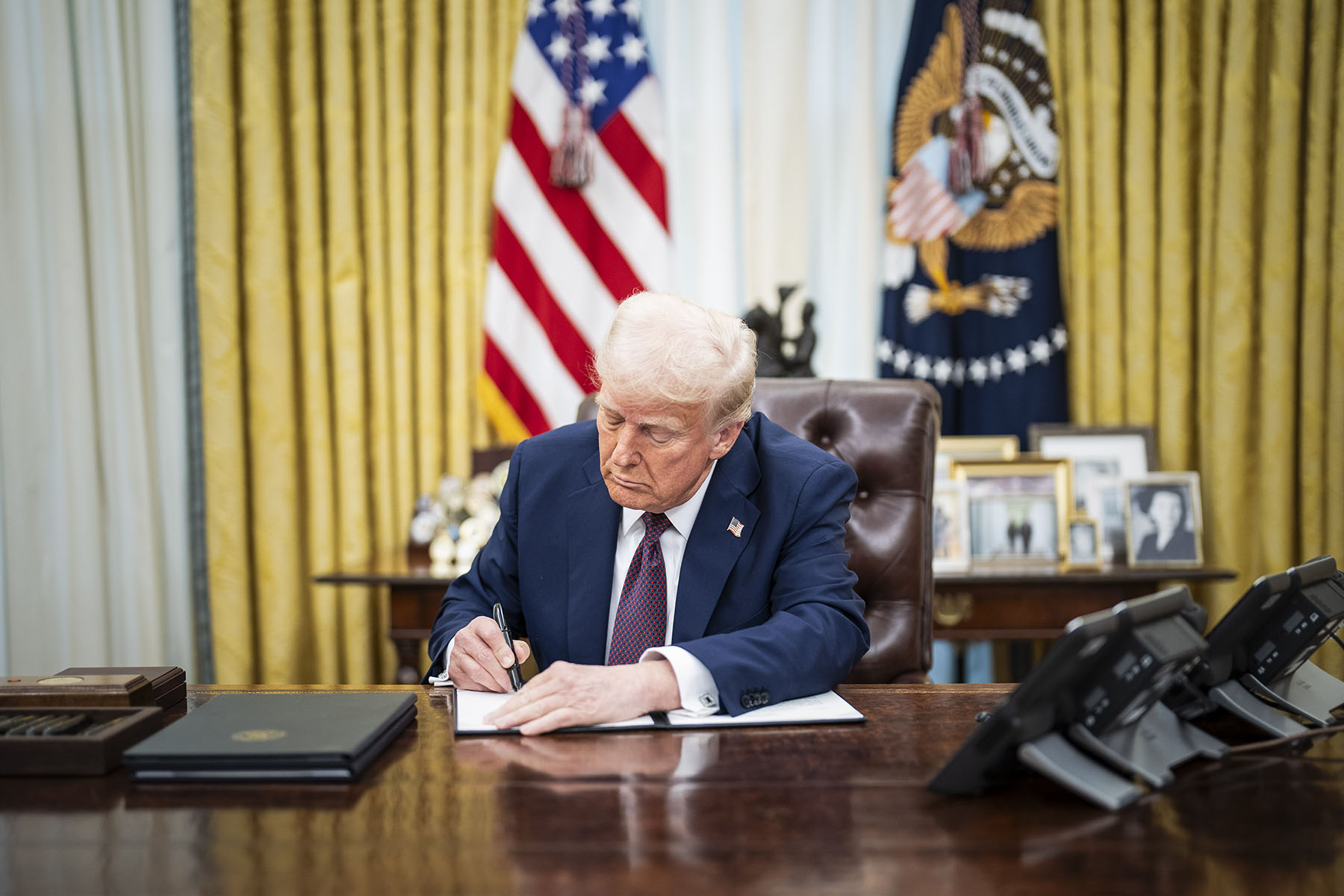This column first appeared in The Amendment, a biweekly newsletter by Errin Haines, The 19th’s editor-at-large. Subscribe today to get early access to her analysis.
Five days before the election, Donald Trump declared before his cheering supporters that as president, he wanted to “protect the women of America.”
“I said, well, I’m gonna do it — whether the women like it or not,” Trump announced, after saying that some members of his campaign told him the statement was “inappropriate.”
In his first month in office, Trump has signed executive orders that he claims fulfill his promise. Trump is, he says, making good on his inauguration speech pledge to “end the government policy of trying to socially engineer race and gender into every aspect of public and private life.”
On the day he was sworn in, he decreed that the federal government will recognize only two genders for the purpose of “defending women’s rights.” He banned transgender athletes from competing in women’s sports in the name of protecting girls’ “safe and fair” participation, signing the order on National Women and Girls in Sports Day with mothers and daughters looking on. His administration has made moves to freeze federal grants, which are relied on by nonprofits that work to support victims of abuse, and has removed data on women’s health from federal websites.
Trump has also nominated men to serve in his Cabinet — former Florida Rep. Matt Gaetz, his initial pick for attorney general; Defense Secretary Pete Hegseth; and Health and Human Services Secretary Robert F. Kennedy Jr. — who have been accused of sexual assault and whose character raised concerns about whether their approach to governing could be harmful to women. Gaetz, Hegseth and Kennedy have all denied wrongdoing.
A recent Economist/YouGov poll showed 64 percent of Americans — 69 percent of men and 60 percent of women — support Trump’s executive order on transgender athletes. Among people who voted for Kamala Harris, 36 percent support the order, compared with 93 percent of Trump voters. Those numbers indicate that even voters who don’t like him overall — his approval rating in this poll stood at 46 percent — agree with Trump on this issue.
The popularity of the order stands in contrast with the small number of transgender athletes participating in girls’ and women’s sports. Some people see it as a solution in search of a problem, scapegoating a few trans girls and women to score political points.
At his one-month mark in office, I wanted to know how women voters thought about Trump’s pledge to protect women and if they feel his actions since returning to office reflect his words from the campaign trail.
Atlanta resident Jaime Graham doesn’t remember seeing or hearing Trump’s remarks at that October rally. She said his stance on women was not a factor in how she voted, but added she’s “thrilled” that the president signed an executive order last week banning transgender athletes from women’s sports.
“The women’s sports issue was very motivating for me personally,” said Graham, 47, who has an 8-year-old daughter active in sports. “I’m glad he addressed it. A lot of the things I see, it’s like excess that has been festering. He’s sort of righting the ship on things that shouldn’t have been an issue in the first place.”
Diana Henneuse, 60, voted for Kamala Harris in November, but had hoped Trump would spend his first month focused on building bridges in Washington, putting together a qualified team to help him govern and targeting issues like the economy or airline safety. In the past month, the Bellevue, Washington, resident who works in public school administration has talked to her husband and women in her life, including her college-aged daughter, about Trump’s presidency and said everyone in her immediate circle is “worried and scared.”
She does not talk politics much with girlfriends she suspects voted for the president. When asked whether she thinks Trump has acted to protect women in his early days back in office, Henneuse laughed.
“I have never felt that Donald Trump cares one ounce about women,” she said. “I have never felt protected by him. He cares nothing about our rights. His actions have shown it through the years. There are other things he should be tackling. He’s doing that to appeal to the people who elected him.”
Henneuse is also concerned about the women and girls who could be impacted by Trump’s executive order targeting the U.S. Agency for International Development program that provides foreign aid to impoverished countries and his executive order targeting diversity, equity and inclusion initiatives in the federal government. She said his actions are out of step with “human rights” and “not in sync with society right now.”
The Economist/YouGov poll showed that 45 percent of Americans supported DEI programs, compared with 36 percent who did not. Half of women supported them, versus 41 percent of men.
“He’s trying to eliminate federal jobs … there’s a lot of minority women in those jobs,” Henneuse said, referring to Trump’s buyout offer for federal workers, nearly half of whom are women and nearly 20 percent of whom are Black. “Washington is a very diverse city. The message is: we don’t value you.”
Anne-Marie Ashe, a Black woman who voted for Harris, said her group chat has been buzzing with news of the administration. She said that she has only felt more guarded in the month since Trump has taken office and that his actions feel “overwhelmingly aggressive.”
“It’s almost a full-on attack against women,” said Ashe, 38, who owns a real estate brokerage in Washington, D.C., and is particularly concerned about the president’s efforts to dismantle DEI programs.
“A lot of people are going to lose jobs and it’s going to be a situation where it’s going to be difficult for them to survive or move up the corporate ladder,” she said. “It feels like everything that was pushed forward is now rolling back with the swipe of a pen, based on how one person thinks. It seems like their lives don’t matter.”
The executive orders on trans people feel like they’re personal to him, she said, and not about what will help Americans. As his presidency continues, Ashe hopes Trump will ask women what matters to them.
“There may be changes that need to happen, but just getting our opinion on what might be beneficial or what has been working that he may want to keep” would help, she said. She feels like her lived experience as a Black woman isn’t valued.
To Graham, things had been moving too far in a direction she did not want on gender. She felt phrases like “birthing person” erased her experience as a woman and a mother and said she has seen women gaining opportunity in her lifetime.
“We don’t need anyone’s help; just don’t do stuff that hurts us,” Graham said. “You used to see a lot of really unfair stuff happening. I don’t feel like that anymore.”
But Graham does see the issue of transgender athletes competing in sports as “an injustice.” Fewer than 10 transgender athletes are competing in women’s collegiate sports, out of more than 500,000 student athletes, according to the NCAA. As far as Graham knows, her daughter hasn’t played sports with any trans girls. She said a solution is needed that would work for everyone.
“I would love to understand the viewpoint of why they need to be in the dressing rooms and the private spaces,” Graham said. “I still don’t understand what the point of all that is. They didn’t try to work with people, it wasn’t done in a way that was comfortable for everybody.”
Women and LGBTQ+ people do face legitimate risks to their safety in the workplace, in public spaces, in the military, on college campuses and from intimate partners — impacting how they are able to participate as full citizens in public life. Government has attempted to address these risks through anti-discrimination policies. DEI programs have most benefited White women, creating opportunity and access for them into roles and spaces previously held by White men.
So far, one of the biggest impacts of Trump’s actions has been chaos: for kids and adults seeking gender-affirming care and doctors providing it, nonprofits working to combat domestic violence, federal workers, people trying to diversify workplaces, those trying to address sexual assault in the military. Trump is protecting certain ideas about how he thinks the country should be.
Correction: An earlier version of this article misstated what data had been removed from federal websites.








